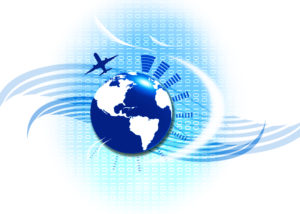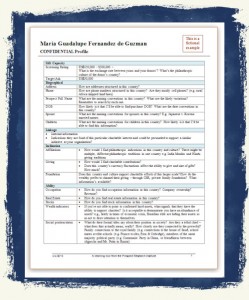 by Sabine Schuller
by Sabine Schuller
International. Mondial. Global. Weltweit. 全球. What do we mean when we say that? More often than not, the frame of reference is someone’s home country as the center. Everything outside the borders is “foreign” – equally intriguing and puzzling.
Norwegian and U.S. citizens might be mutually surprised, not realizing one country publicizes every tax return online while the other’s tax law strictly prohibits it. In the same way European donor researchers can be delighted when they realize how much information is publically available in the U.S., American researchers are frustrated seeking online, free, searchable real estate records in Bermuda.
When you as a prospect research professional embark on a ‘trip’ using international research, what are the must-haves in your suitcase?
- Number one on the packing list is an open mind: What is different (besides everything) about finding information in this country and culture?
- A map – also known as a plan: You only have so many resources (time and money!) to spend while you’re here. How will you best take advantage of your visit?
- Identifying your guides: What resources or which experts will point you in the right direction when you’re lost?
- The stories you share once you’ve returned ‘home’: How you translate what you learned can mean the difference between gift officers’ mere polite interest or excitedly planning the next ‘trip’ to find out more.
While every international research trip will need a different map, click the profile picture on the right for a series of contextual questions you can use as guideposts.
Once you have a strong sense of what you’re looking for, take a moment and think. Who or what would have information about this topic, has a vested interest in sharing their knowledge, ideally for free or low cost? It could even be a combination of secondary and primary sources – an answer in a database and then an expert helping you understand the context of what it means.
In a best case scenario, you might find an exact equivalent of the info source you’re familiar with available in your native language. For example, Norway puts everyone’s tax returns online, and some Swiss government websites post information in multiple languages like German, French, Italian, English and Romansh.
Then again, you might have to adjust your expectations when you realize you have to search in another language or can only find wealth indicators instead of hard asset data.
If you’ve done your best to find information on your own and still feel lost, there are resources and search experts that can help guide you.
Your fellow donor researchers!
- The Prospect Research Institute has been building a collection of international research links
- APRA International and local chapters such as NEDRA, CARA and APRA Canada sometimes host special international research training sessions.
- You can search the Prospect L archives to see if anyone has already answered a similar question.
- CASE has conferences on international fundraising as does the Resource Alliance
Other Search Experts
- Journalists and librarians – Links to their associations and resources can be found in this Link Pages list category.
- Due diligence and insurance professionals as well as the police-force also contribute to all of our knowledge about finding information.
People with local knowledge
- Local donors, advocates, fundraising and other staff, friends/family familiar with that country/culture might be flattered you are interested in learning more about their area.
Resource guides
- Videos, books, online courses, blog posts, tutorials, library research guides
- A good example is the international business guide at Northwestern University
Vendors with international presence or local expertise
- UK’s Prospecting for Gold
- Helen Brown’s resources
- Beth Bandy International Fundraising Intelligence’s blog
To make the most of researching in a country other than your own, bring your open mind, develop a plan, identify your guides, and interpret your results to help others see what you do – persuading them to take future journeys with you.
Enjoy the adventure!
About Guest Blogger
Sabine Schuller, MLIS works at The Rotary Foundation, a volunteer organization of professional and business leaders that initiates humanitarian projects worldwide. As a donor researcher, she identifies and analyzes donors around the globe. She was also a program officer for Rotary, coaching grant applicants in Latin America, Europe, and North America. Sabine’s first experience in the nonprofit world was at Northwestern University. She developed industry analyses for new commercial opportunities at an international business development center. Sabine is a proud member of the Illinois donor research chapter APRA-IL and also supports her local business librarian association, SLA-IL. Connect with her on LinkedIn.
